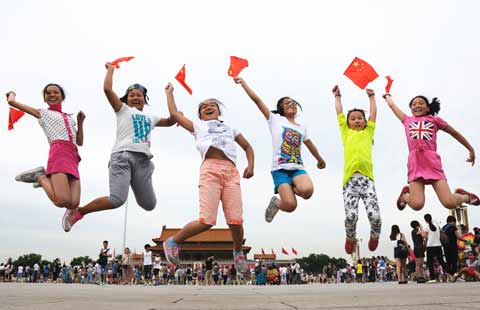Richer China to benefit world
(Xinhua) Updated: 2012-12-26 11:16BEIJING - As the new Chinese leadership has been gearing up to double the country's 2010 GDP and per capita income by the year 2020, a stronger China and richer Chinese population could also help to stimulate the lackluster global economy.
Compared with the world's major economies such as the United States and some European nations, China's current consumption rate is relatively low.
If the country's newly designed income-doubling scheme could be realized as scheduled, it means that the Chinese people would have more money in their pockets to spend, and their demand for products and services from other parts of the world would also be expanded accordingly.
HSBC has predicted recently that the annual growth rate of US exports to China could be raised to 10.4 percent over the next three years, and would further rise to 12 percent between 2016 to 2020. Britain's exports to China could also see a substantial increase.
As the demand is growing, more and more Chinese choose to go abroad for both touring and buying brand name products. Nowadays it has already been quite common to see crowds of Chinese customers going on shopping spree for products of international brands in department stores and outlets worldwide.
According to the World Tourism Organization, the Chinese spent as high as $72.6 billion last year outside China, ranking the third in the world.
China's rising demand would also help to expand its imports from other countries and regions, thus making the nation's trade more balanced.
Meanwhile, as the Chinese economy continues to grow, home-grown Chinese enterprises would also have more capital and capacity for overseas investment. That would be good news for overseas industries that are short of funds and markets.
With the growing cost of labor, Chinese firms are forced to move their production lines to countries and areas in Southeast Asia and Africa while maintaining their designing and research sectors at home. And the countries that harbor Chinese investment could receive more capital, technologies and job opportunities as part of China's growth dividends.
The Chinese companies would also work to promote their development by following a capital, technology and service intensive pattern, so they can better serve custumers worldwide with more cost-effective, environmental friendly and energy saving products.
Daniel Rosen, visiting fellow at the Peterson Institute for International Economics, has said recently that China's global direct investment assets would rise from $400 billion today to 1 or even 2 trillion by 2020.
It is expected that as the Chinese government is determined to boost development of an advanced manufacturing industry and accelerate transition of traditional industries, the global competitiveness of Chinese companies would surely be further enhanced.
Additionally, the Chinese currency is also moving fast along its path toward internationalization.
As the world's second largest economy and trading power, the amount of renminbi that was used in cross-border trade surged from an equivalent of $506.3 billion in 2010 to 2.08 trillion last year, making the currency the world's third-biggest trade settlement currency.
In the next decade, it is possible that China could overtake the United States to become the world's top trading power, and the Chinese renminbi could be used as the settlement currency on an even more expanded scale.
It has also been increasingly apparent that the Chinese currency has been taken as a financial asset. In Hong Kong, an renminbi off-shore market has seen fast development, while London is also working to build an international market center for the renminbi.
In the long run, an internationalized renminbi can promote the diversification of global reserve system that is currently dominated by a volatile US dollar.
With targets being set, China will vigorously pursue a balanced, coordinated and sustainable economic growth pattern.
As China restructures its development model and enriches its people, the country's renewed economic vitality shall help nurture prosperity across the whole world.
- Playing virtual games in the real world
- Sports consumption a big winner
- Jilin Grain gets $1.5 billion in bid to restructure
- Alphabet tests drones as US considers new rules
- Sinopec to sell 50% of its gas pipeline
- E-shopper experience to go high-tech with Buy+
- Baidu, Xiaomi bullish on India
- LeEco and Netflix may share content


















